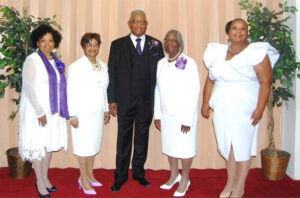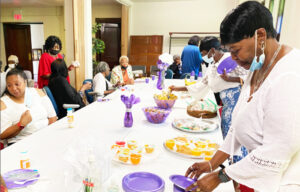
By Dawn Scotland
The Truth Reporter
St. Paul Missionary Baptist Church held its first “Alive and Well Women’s Conference” Saturday September 18. The program, which is a part of their annual Women’s Day Celebration, featured five esteemed female panelists across various disciplines who discussed the issues facing the wellbeing of women today.
“We want women to have wisdom and knowledge concerning the various aspects of their lives to help them have a better life, is what we’re working towards…”, said Women’s Day Chairperson Yvonne Gayle. “All of the topics are most important for the women of today. That’s why we chose this [them].”
She spoke on the present anxiety in society today.” We want to be able to prepare our women for these different difficulties and vicissitudes of life that they encounter.”
Gayle expressed the importance “we have a high suicidal rate in our community, we have much and too much domestic violence [and] we need to educate ourselves concerning those particular topics.”
Sister Daisy Fisher, Women’s Day co-chairperson, provided the welcome. Followed by Sister Lenora Barry who served as facilitator for the event. “We need to recognize that in this community and everywhere we go – we can make a difference if we choose to make a difference,” remarked Barry .
The theme for the event was “Caring for Your Whole Self: Focusing on Wellness,” Attendees enjoyed a complimentary continental breakfast preceding the presentation. Guest presentations included:
- “Wellness and Women” – Dr. Meiuttenun Brown, MD
- “Disparities in Women’s Health and Infant Mortality” – Kimberly Toles
- “Mental Health in our Minority Communities and Churches” – Sonya Quinn
- “Domestic Violence” – Kimberly Sanders
- “Black Maternal Caucus” – State Representative Paula Hicks-Hudson
 The women at St. Paul addressed these issues in hopes of shining God’s light, educating its membership and the community.
The women at St. Paul addressed these issues in hopes of shining God’s light, educating its membership and the community.
Dr. Brown is a graduate of Spelman College with a bachelor of science degree in biology/pre-medicine, the University of South Carolina with a masters of Public Health and a medical degree from Morehouse School of Medicine
She is board certified in obstetrics and gynecology and she has practiced in Detroit as a National Health Corps Scholar working in an urban, underserved area after residency. She moved to Toledo after her service with the Corps and has also worked in home care as a general practitioner.
Kimberly Toles is the Minority Health Program Coordinator for the Toledo Lucas County Office of Minority Health, Toledo Lucas County Health Department. She earned a master’s degree in Clinical Mental Health from the University of Toledo, served 20 years as a forensic counselor with the Lucas County Sheriff’s Office, is a certified suicide instructor and a certified chemical dependency counselor.
Sonya Quinn is the Community Engagement Coordinator for NAMI (National Alliance on Mental Illness) and has over 10 years working in the mental health field. She is a native Toledoan and attended the University of Toledo earning a bachelor’s degree in Business Administration. She is the chairperson for NAMI’s African American Leadership and Latino Leadership Initiative, an executive committee member for the Lucas County Human Trafficking Coalition, a member of the Trauma Informed Care Advisory Board and a member of the Toledo Minority Health Advisory Board.
Kimberly Sanders is a long-time health care coordinator and domestic violence advocate. She earned a bachelor’s degree from Lourdes University and a master’s in Human Development and Family Studies from Spring Arbor University. Most of her professional career has been in higher education, educating health care professionals, most recently working with woman and children experiencing domestic violence.
Each woman spoke for 10 minutes addressing important health issues of concern for the African-American community, particularly issues impacting women.
Dr. Brown, obstetrician, provided and defined for the group the Six Dimension of Woman’s Wellness: physical, emotional, spiritual, intellectual, occupation and social, stating, “Wellness deals with the whole being for a better quality of life… if we are no good we are no good to anyone else.”
Kimberly Toles provided the mission for her office, to “advocate for black and brown people in order to find out why we are so disproportionately disadvantaged when it comes to things like health, insurance, housing, education – anything that we can name – we want to get out and raise that awareness.” She and her colleague presented statistics and figures on the different disparities affecting black women. “A lot of time what you don’t know – you don’t know you don’t know,” stated Toles.
“We want women to know – we have a right, you can ask,” said Toles, emphasizing the duty of Black women to press for answers concerning their health and that of their babies. “Babies die disproportionately [in the Black community] because we don’t go to the doctor, we don’t get treatment.”
Toles spoke of the need to find about the resources available to women and families, the need to find out about the secrets that are kept from them due to systemic racism.
Mental health, said Quinn, is “that subject we just don’t want to talk about … but we need to erase the stigma. Our mental health needs to be cared for just like our physical health.”
Quinn informed her audience of about 50 women that having a mental health issue or problem does not “define who you are … does not stop you from being who you are.”
Sanders, speaking on the subject of domestic violence, stated: “Domestic violence is all about power but not just about physical power – it’s also about emotional, verbal and financial power.” Sanders offered her audience a number of suggestions about working with those who are victims of domestic violence suggesting that they avoid the straightforward accusation: “Why don’t you just move out?”
Be indirect, express concern, suggest alternatives to their present situation, she said.
Hicks-Hudson spoke of the “Black Maternal Caucus,” the goal of elevating the Black maternal health caucus within the legislature to find policy solutions to improve health outcomes and eliminate disparities.
“The hypocrisy of some of my colleagues is so real,” said Hicks-Hudson of the failure within the state legislature to address issues of concern to maternal health, especially black maternal health.
“In Toledo, we are one of the worst areas on maternal health, particularly black maternal health; infant mortality in Lucas County is at the bottom of the list and race is a primary factor.”
Hicks-Hudson told her listeners that so much of what happens in Columbus happens fairly quietly compared to the news out of Washington, but as far as many issues, such as health issues, what happens on the state level is so much more important to the average household. Therefore, she urged her audience to vote, to encourage others to vote.
“It’s important what happens on the federal level, but Columbus is the real deal … exercise and eat right, but also vote.”
The entire presentation can be viewed on St. Paul’s facebook page.
